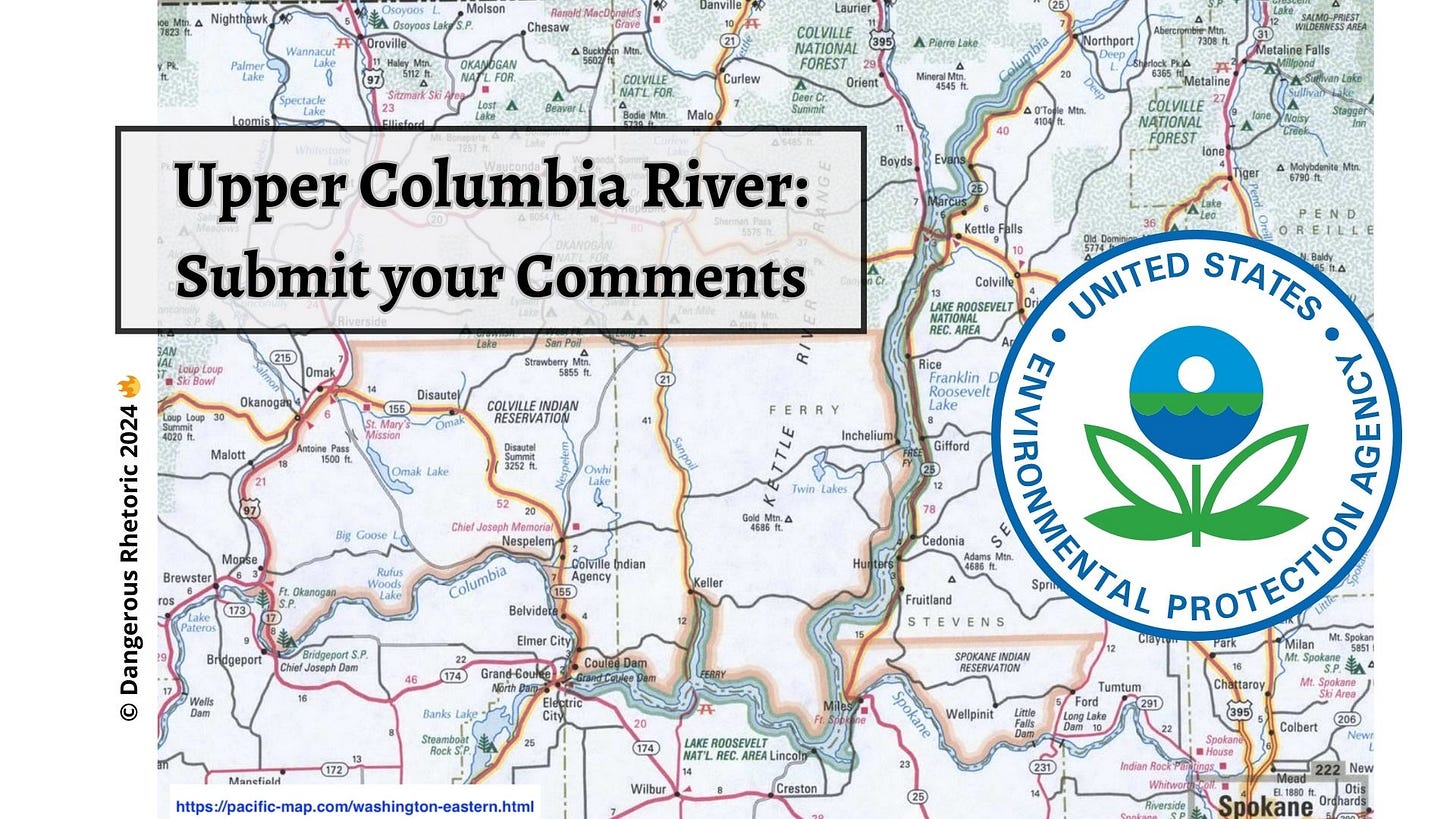This is part seven of a series of articles about the proposed EPA Superfund site on the upper Columbia River. The previous articles are available at thinkspot.com and nancydchurchill.substack.com. In this article, we discover where to make comments and what to consider as your write your comment.
Should the Upper Columbia River be an EPA Superfund Site?
In this series, we have explored the scope of the past pollution, the size of the target area, and the remediation that has already been accomplished. We took a look at the massive size of the Grand Coolie Dam, the enormous length of the proposed site, and the importance of the Columbia Basin project to eastern Washington agriculture.
We’ve taken a careful look at the 2006 Settlement agreement with Teck American which mandated certain studies be completed under the supervision of the EPA BEFORE a superfund designation would be considered. In spite of the fact that the studies are not complete, the EPA is pushing for an early designation of a Superfund for the UCR, and against the recommendation of local government leaders. Why?
The Human Health Risk Assessment is the only one of the scientific studies which has been completed. These study results on their face do not appear to support the need for a Superfund site. Environmental impact studies are still ongoing, and are expected to be completed in the near future. Feasibility studies, also incomplete, will make recommendations about what remediation actions should be done, and how much of the proposed site should actually be considered for designation. Without these missing studies, it seems like the EPA is pushing to make a decision without important scientific data (EPA Fact Sheet).
Who Benefits, Who Loses?
The EPA, the Inslee Administration (including Washington’s Department of Ecology) get enormous federal and state political power over a large section of Eastern Washington and the vital upper Columbia River. The Spokane Tribe and the Confederated Colville tribes also gain political power and control. All of these entities stand to benefit from payments made the environmental industrial complex for “cleanup.” Perhaps some of the area will be cleaned up. That remains to be seen.
The local communities, local businesses, and local governments believe this proposed Superfund designation, which is not yet proven to be needed, will devastate their economies and businesses. This wouldn’t be the first time that entire communities and thriving economic sectors have been shut down in Washington state in the name of “protecting nature.”
Remember the northern spotted owl? Turns out that the problem wasn’t logging, but an entire sector of the economy was shut down by mistake. Do we want to repeat that mistake in Eastern Washington?
URGENT: Submit your comments to the EPA.
We only have until May 6 to submit comments on the proposed listing on the National Priorities List. Comment on the Upper Columbia River Superfund proposal here: bit.ly/4attNZp.
On the EPA Comment page, there is a pop-up page with a some tips to consider as you make your comment:
"These tips are meant to help the public submit comments that have an impact and help agency policy makers improve federal regulations: Read and understand the regulatory document you are commenting on. Feel free to reach out to the agency with questions,. Be concise but support your claims. Base your justification on sound reasoning, scientific evidence, and/or how you will be impacted. Address trade-offs and opposing views in your comment. There is no minimum or maximum length for an effective comment. The comment process is not a vote—one well supported comment is often more influential than a thousand form letters."
The complete text of these tips is available at: bit.ly/3PzmV4M.
What’s best for Eastern Washington?
What ever you do, it's time now to make a comment on this proposed Superfund listing. We all need to show up and let the EPA know what we think about Lake Roosevelt. Should it become a Superfund site or not? Just remember, it's almost impossible to get off the Superfund list once we're on it. Is that what's best for Eastern Washington and the Upper Columbia River?
Nancy Churchill is a writer and educator in rural eastern Washington State, and the state committeewoman for the Ferry County Republican Party. She may be reached at DangerousRhetoric@pm.me. The opinions expressed in Dangerous Rhetoric are her own. Dangerous Rhetoric is available on thinkspot, Rumble and Substack.
Sources:
1) 2006 Settlement w/ Teck American: https://bit.ly/3Vnhrhk
2) EPA News Release 3/5/2024. https://bit.ly/4acaKmm
3) DR Human Health Risk Assessment: https://bit.ly/4cDamiH
4) EPA Fact Sheet: https://bit.ly/3Pp3cF2
5) Governments supporting: https://bit.ly/3xxfoxk
6) Governments opposed: https://bit.ly/3UhklDw
7) Comment on the Proposed UCR Superfund: https://bit.ly/4attNZp
8) EPA Commenter's Tips: https://bit.ly/3PzmV4M





Superfund comment submitted. Thank you, Nancy, for making us aware of this issue and for giving us such a thorough background on its pro's and con's.
No Super Fund ! no more repeats of the Spotted Owl, and the impact it had on Washington State.